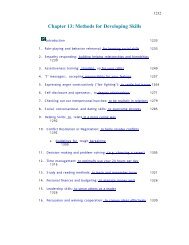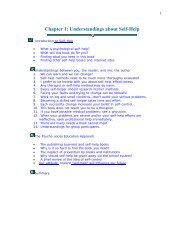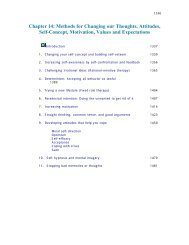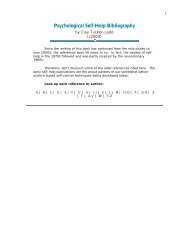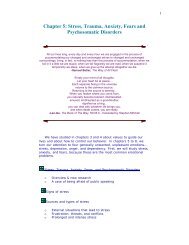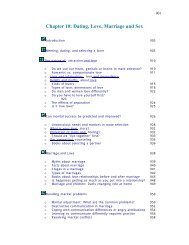Methods for Changing Behaviors - Psychological Self-Help
Methods for Changing Behaviors - Psychological Self-Help
Methods for Changing Behaviors - Psychological Self-Help
Create successful ePaper yourself
Turn your PDF publications into a flip-book with our unique Google optimized e-Paper software.
Time involved<br />
Only a few minutes will probably be necessary to make up a sign<br />
or a schedule <strong>for</strong> the day. It takes awareness and good intentions to<br />
avoid certain situations but ordinarily not much time. The<br />
"programming" of implementation intentions takes only a few minutes<br />
but it has to be done in advance of getting into the action-initiating<br />
circumstances. So, like the other techniques in this section, advanced<br />
planning is required.<br />
Common problems with the method<br />
Most unwanted behavior occurs because we, in part, want it to<br />
occur and put ourselves in situations where it is hard to avoid. The<br />
would-be dieter has more than 1200 calories of food on hand; the<br />
smoker has a whole pack on him/her instead of just 5 cigarettes.<br />
Likewise, desired behavior occurs when we are in the right place.<br />
Recognizing the power of the environment to control our behavior and<br />
providing a variety of reminders can help, but we may frequently<br />
ignore the warning signs or prompting cues. If so, soon we won't even<br />
bother to put the signs up or we won't bother to go to the "right"<br />
place. The usual difficulty with the implementation of our intentions is<br />
that we don't take the time to plan and make the mental connection in<br />
advance between a specific situation and a specific behavior.<br />
Effectiveness<br />
<strong>Changing</strong> the environment is one of the best methods of selfcontrol<br />
you have; it is simple, safe, effective, and quick. The<br />
disadvantage is that we are frequently unable to impose the method<br />
on ourselves--we "<strong>for</strong>get," cheat, give up, "change our minds," or<br />
decide to start changing tomorrow. In that case, perhaps more<br />
reminders and rewards <strong>for</strong> doing the desired behavior are needed<br />
and/or more punishment <strong>for</strong> neglecting the signs. Nevertheless, it is<br />
one of the best self-help methods. The laboratory experiments done<br />
with implementation intention suggest it is quite effective in that<br />
setting; how it does in ordinary life is yet unproved but more practical<br />
research is being done.<br />
Additional readings<br />
Watson and Tharp (1972) are good; see their chapter 9. The more<br />
radical behaviorist, contrary to what one might expect, places more<br />
emphasis on changing the environment than on self-rein<strong>for</strong>cement<br />
(Brigham, 1982). Birkedahl (1990) is a cognitive-behaviorist. See a<br />
new book by Gollwitzer, P. M., Schaal, B., Moskowitz, G. B.,<br />
Hammelbeck, H. J. P. & Wasel, W. (1999) about reducing stereotyping<br />
and prejudice.<br />
Case illustration<br />
1075




